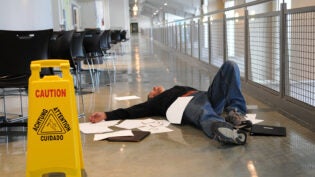
We all know Murphy’s Law: “Anything that can go wrong, will go wrong.” And in business, it’s true—especially in a new startup business.
Unfortunately, you’re so busy just trying to stay afloat that you don’t have time to make contingency plans! But, it does help to think about the what-ifs: what are the worst things that can happen? Because at some point, they probably will. You’ll be lied to, cheated from, stolen from, and possibly even sued. Employees will start fires, get into accidents, and cause you more problems than you can possibly imagine. Welcome to the world of being a small business owner!
When bad things happen—which they will—do you close up shop? Nah. You readjust, learn from it quickly, and move on. Plan for what you can in advance, and deal with the rest as it happens.
Here are some common bad things that could happen, and what you can do about them:
A road closure diverts traffic away from your shop. If you know about the closure ahead of time, make sure customers know you’re still open for business. Send out an email blast and don’t forget to update your website with detour information. If the road closure was a surprise to you, stay on top of community news, so you can take your fight to the city council next time. If that doesn’t work, get ready to buy a gorilla suit and stand near the road waving your arms.
You suddenly find out that your long-time banking relationship… doesn’t exist. This is my favorite unexpected catastrophe. It’s happened to me twice! Here’s what you do. While everything is comfy-cozy with your existing banker, start “courting” another banker. Let this other banker buy you lunch once a quarter and regularly share your financial statements. That way, when your existing banker turns against you, for whatever reason (they all will from time to time), you’ll have the second banker happily waiting in the wings with open arms!
The power goes out at your business. There isn’t much you can do about a power failure, but depending on your type of business, you can find some old-school ways to stay open. Have some Coleman lanterns, flashlights, or even candles stashed in the back. Or better yet, how about a $500 portable generator and some extension cords from Home Depot? The good news is that the lights will come on eventually. But before the power goes out the next time, look into renting a location that has a backup generator as a power source.
Your main supplier goes out of business. Someday it will happen to you, so be ready. Establish relationships with other vendors ahead of time, so you don’t lose momentum when a supplier does go belly-up.
A key employee quits. This will happen, and it can sink your boat if you’re unprepared. Be prepared to split up the major tasks among your remaining employees or hire a temporary worker while you’re interviewing replacements. And always be keeping your eyes open for good potential employees everywhere you go, and make sure to take note of where you saw or met these people.
A vital piece of equipment breaks. Learn to fix your own equipment yourself, and keep some spare parts around. If you can’t fix it, perhaps you can rent one for a day. If neither is possible, you better make sure you’ve got great relationships with multiple repairmen. Of course the best scenario is, if you have the money, consider buying a second machine as a working backup.
You lose your biggest customer. If you’ve done your best to make it right, thank them for their business and move on. These kinds of customers are a gift, but they don’t last forever. The lesson here: Don’t ever expect one customer to keep your business afloat. Cultivate new business relationships all the time, even when things are going great.
Murphy may have been a jerk, but he was right. (He must have been a small business owner.) What can go wrong, will. So be as prepared as you can be, learn from these situations, and try to take steps to avoid repeats!
Published: October 11, 2013
2629 Views
2629 Views












